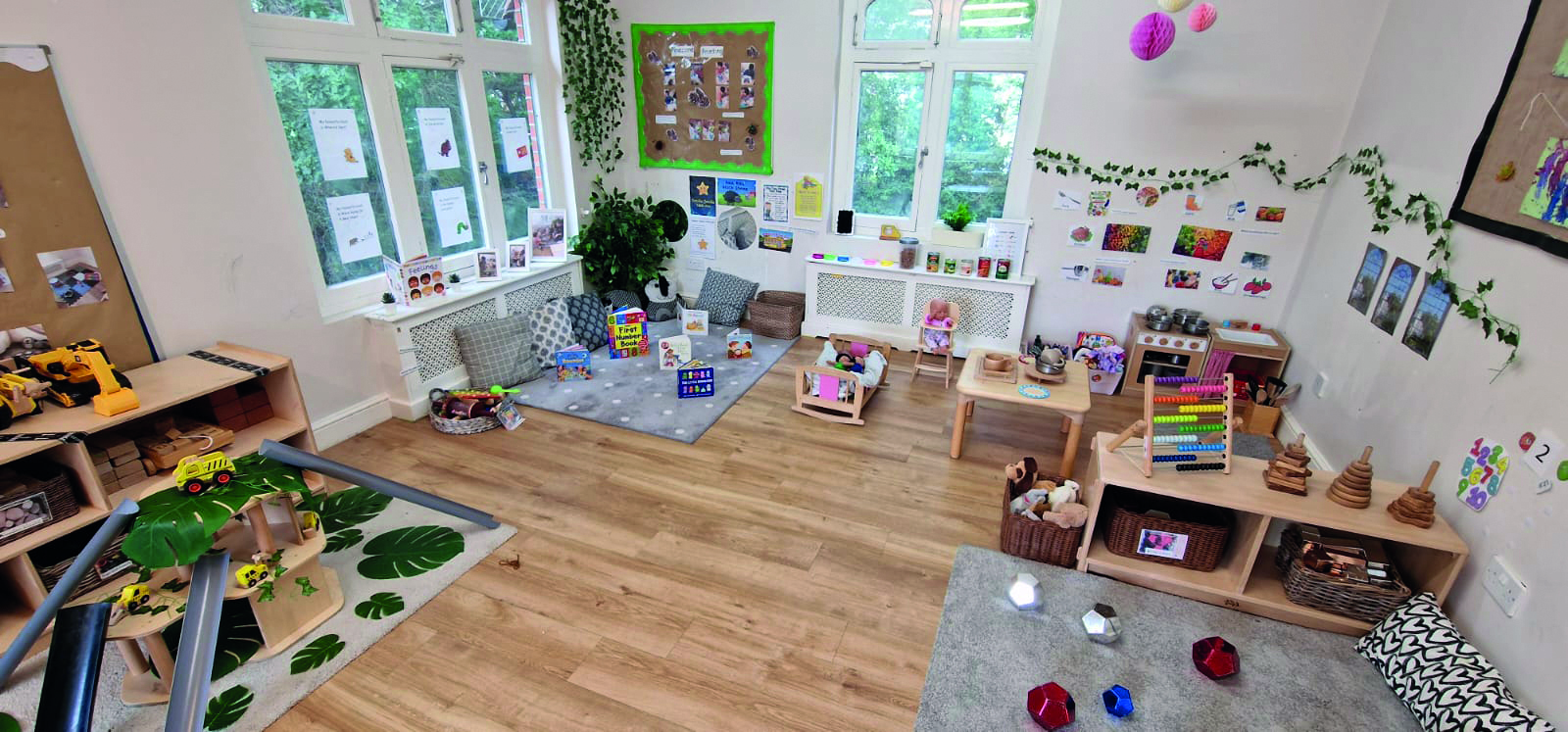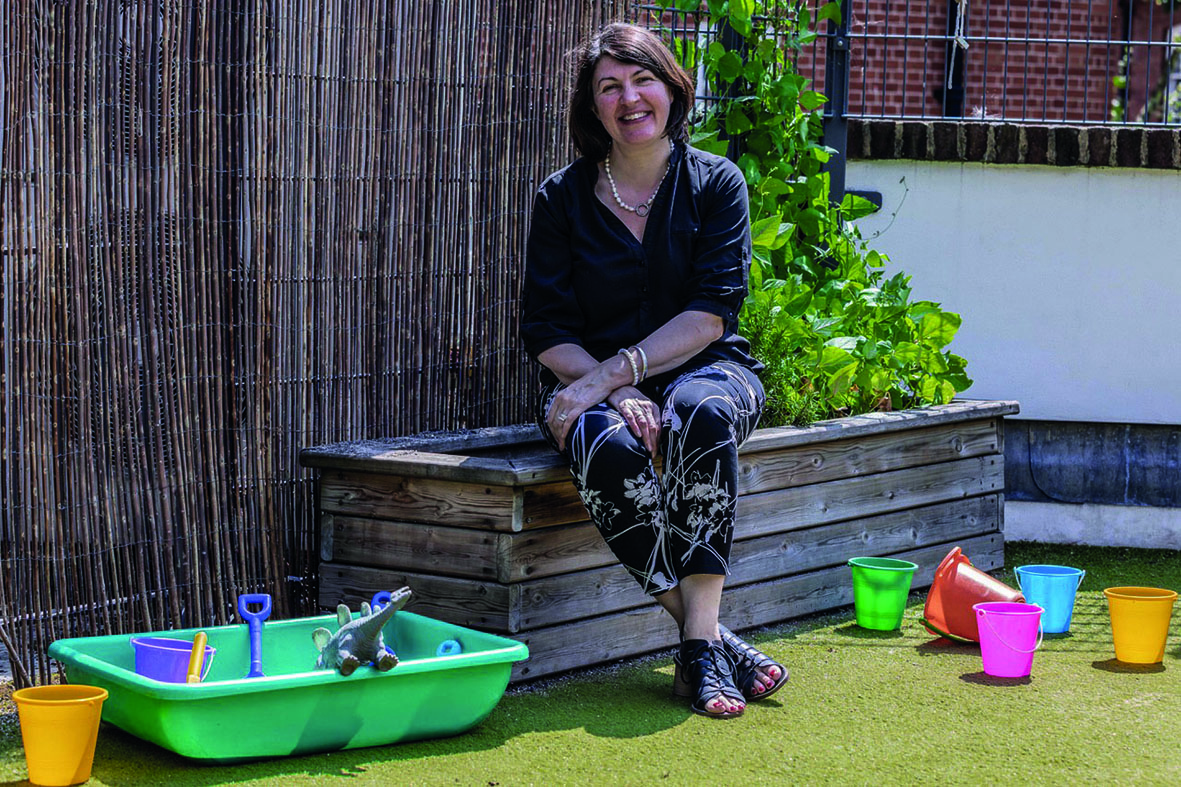
 Despite high interest rates and the challenge of securing debt, a negative economic outlook and rising inflation, the nursery market has bucked the trend this year, as mergers and acquisitions (M&As) have continued in the face of declining activity in other sectors.
Despite high interest rates and the challenge of securing debt, a negative economic outlook and rising inflation, the nursery market has bucked the trend this year, as mergers and acquisitions (M&As) have continued in the face of declining activity in other sectors.
‘M&A in the nursery sector has held up incredibly well,’ says Arun Kanwar, partner at Cairneagle. ‘There's this sense of nurseries being social infrastructure and having strong, long-term tailwinds and protectivity.’
Ben Barbanel, head of debt finance at OakNorth Bank, agrees. ‘This has clearly become a very interesting roll-out industry for private equity, which used to deploy a lot of money into more disposable income industries like restaurants.
‘Now, they are obviously thinking it isn’t looking great for restaurants over the next few years, and are looking for other industries with characteristics of ramp up and roll out, and buy and build. This has been deemed one of them.’
A hot market has been propped up by highly active brokers, with specialist property adviser and broker Christie & Co reporting one of its biggest years to date.
 Leah Turner, co-founder of new specialist broker Owen Froebel, which launched in July this year, explains, ‘What we can certainly say is the market is strong enough that new brokers like us can enter it. That alone shows the nursery market is far from cooling.’
Leah Turner, co-founder of new specialist broker Owen Froebel, which launched in July this year, explains, ‘What we can certainly say is the market is strong enough that new brokers like us can enter it. That alone shows the nursery market is far from cooling.’
Kanwar attributes many sales to owners trying to capitalise on this busy period.
‘A large proportion of the selling up has been trying to take advantage of a very hot market, all the way from single sites through to large groups, from nurseries in a state of distress to very successful groups,’ he says.
Barbanel adds that the current combination of sellers and buyers is ideal to ensure deals are numerous and sizeable. ‘You’ve got owners who are worn out from Covid times, coupled with big boys with big pockets chasing sites to consolidate,’ he explains.
COMPETITIVE CONSOLIDATORS
Indeed, the strong pool of active buyers consolidating their position in the market means there is little sign of any let-up in deals.
This group includes Partou, which added All About Children to its portfolio in one of the biggest deals of the year, Grandir UK, which acquired the Three Little Birds and Maggie & Rose nursery groups, Kids Planet, which took on the Choice Childcare and Little Acorns (Huddersfield) Day Nursery groups, and Family First, which bought Davidson-Roberts.
Other major consolidators are La Maison Bleue, which owns Old Station Nursery and acquired Townsend, Polkadot and Catherine House Nurseries this year; Bright Stars, which bought Cheshire Day Nurseries; and Busy Bees, which purchased Egg Day Nurseries.
‘A lot of the big consolidators are sophisticated buyers, with well-developed M&A teams and processes, and with private equity or public backing, so there just hasn't been the slowdown in this sector we’ve seen in other areas,’ Kanwar adds.
‘You’ve also got a long tail of other operators looking to continue to grow their UK portfolios like Happy Days, Kindred, N Family Club and KMK Kinderzimmer.’
TWO-TIER MARKET
 These established buyers are driving the market, agrees Nick Brown, director and head of childcare brokerage at Christie & Co, but economic conditions are making it harder for smaller businesses to get a look in.
These established buyers are driving the market, agrees Nick Brown, director and head of childcare brokerage at Christie & Co, but economic conditions are making it harder for smaller businesses to get a look in.
‘At the top end of the market, groups are still very hungry for deals, and are paying some eyewatering prices for stuff due to competitive tension,’ he says.
‘We’re beginning to see a two-tier market. If you’re going to a bankto secure first-time funding, rates have obviously gone up. So it's a little harder if you’re just coming into the sector, if you’re a first-time buyer or reliant on a heavy amount of funding.’
Indeed, the strength of the larger consolidators is a mixed blessing, Barbanel says.
‘I think the slightly difficult thing is that a lot of smaller potential buyers have been taken out of the market,’ he says.
‘It makes me a bit torn, because obviously I like lending to institutional-grade borrowers with deep pockets. But equally, as a responsible banker and a responsible business, we want to be helping small and medium-sized enterprises in the country to expand. But clearly some of these people have been squeezed badly, and at the moment they just can’t compete.’
CHALLENGES
 Many owners deciding to sell up are those already tired from challenges linked to Brexit and the pandemic, and now facing economic and staffing issues, as well as the ever-present funding woes.
Many owners deciding to sell up are those already tired from challenges linked to Brexit and the pandemic, and now facing economic and staffing issues, as well as the ever-present funding woes.
‘Post-pandemic burnout sales are still very much a thing,’ says Turner.
‘If anything, there may be a bit more urgency to that with the climate as it is, with people thinking if they don’t make this leap now, they may have to weather another three years of recession before they can then finally retire and hang up the keys. They don’t want to have to go through the next crisis, as they feel they’ve served their time.’
Kanwar likens nursery ownership in recent years to being in a boxing ring. ‘It feels like you get through one challenge, then you’re faced with another, and while you’re still dealing with that challenge, another one comes along,’ he says.
‘At the beginning of this year, it was all about Covid recovery. In June, staffing issues were holding back recovery, but the demand was still there. Now, there is softening demand and ongoing challenges.
‘The reality is, from a demand perspective, nurseries serving professional, working parents in relatively affluent areas are holding up better, but the staffing issue is generally worse.
‘Meanwhile, nurseries in areas worse hit by the cost-of-living crisis and economic uncertainty are seeing a larger drop in overall demand levels, as people use informal childcare to manage, but the staffing challenges might not be quite as bad. Not every nursery is facing staffing challenges but it is a chronic issue that is here to stay in the short to medium term.’
As a result, many buyers are seeking to expand in clusters, to ensure they can pool staff across sites, and looking at different areas of the country for consolidation.
‘Our buyer pool used to be in London and the South East, but it's national now,’ says Brown, who has seen significant deals in Leeds, Cheshire and Newcastle, as well as large expansion by ICP Nurseries in Scotland.
Kanwar says staffing can be easier in smaller areas. ‘Staffing tends to be worse where there is a disconnect between where nurseries are and where staff live,’ he explains.
The increase in the National Living Wage to £10.42 from April 2023 will further challenge nursery owners. ‘That will have a big impact, because staffing already accounts for, in most cases, between 50 and 60 per cent of the costs of the business, and that is going to go up even further,’ Turner says.
Overall, the sector goes into 2023 facing tricky challenges, but nothing that should come as much news to investors familiar with the terrain.
‘There are specific issues in the nursery sector that buyers will need to get comfortable with, so it's inevitable that prices will see some level of slowdown,’ warns Kanwar. ‘But the very best assets will continue to hold.’

COST OF LIVING
Buying habits are likely to be affected by the cost-of-living crisis, however.
‘Building costs have gone through the roof and availability of labour has gone through the floor,’ says Barbanel. ‘The amount of beautiful new purpose-built sites has gone down as large groups haven’t been able to expand by opening new sites, so that's fuelled more consolidation through existing sites.’
‘New builds are likely to become unviable for anyone who is not backed by an investor, because banks are going to be less inclined to lend on them,’ Turner agrees.
‘In terms of refurbs, no-one is going to be spending money when they don’t have to. It's going to be very much a mend-and-make-do approach for the next few years. You’re not going to see people spending large amounts on big pieces of equipment, or overhauling the whole place. People are just going to get their heads down and get through.’
Brown suggests that while rising utility costs are hitting nurseries hard, the issue has not led many more to sell up, nor deterred buyers.
He explains, ‘With their bills trebling, everyone has had to take stock, but most of the more entrepreneurial people say you’ve got to keep growing, as long as you don’t overstretch yourself.
‘We’re not seeing huge amounts of distress sales at all at the moment. Generally, people coming to market are being led by the same things they always were, not their electricity bill.’
He notes that while deals have gone through this year for both freehold and leasehold properties, where secure leases have been available, competition has been strong. ‘Partly, a lot of owners want to retain their properties to keep an annual income coming in, and basically create an instant pension,’ he explains.
‘Also, some of the private equity coming into the market is not fussed about buying a property; they don’t really need it. That's driven the leasehold market.’

LOOKING AHEAD
Brown suggests the coming year may see more of the same in terms of M&A activity, if there is not any significant increase in deals.
‘The buyers are there, and some of the multipliers are as high as I’ve ever seen, so sellers are in a very good place,’ he says.
‘I don’t think the multipliers can get much bigger to be honest, because the return on investment won’t work.
‘But even if things just stay static now, we’re in a super place.’
Turner says she thinks that any big changes are likely to be seen some time ahead, because for now the big consolidators look set to enjoy their pick of the market for many months, or even years, to come.
‘There's still so much stock out there that big groups would like to get their hands on,’ she says. ‘I think we’re still a few years away from them needing to change their buying spec. At the moment, they’ve pretty much got free rein to pick and choose.
‘But if the market becomes more competitive, they’re going to get pushback from the micro-consolidators, who in turn will be getting pushback from individuals.
‘Competition will increase, and they will have to go for things that maybe three years previously they would have not wanted. But we’re not there yet.’
CASE STUDY: ‘People believe in our model’
 London Early Years Foundation (LEYF) has raised £1.5 million in funding through a seven-year charity bond, promoted by Triodos Bank's crowdfunding platform, to help finance its aims to expand from providing 4,000 places across Greater London to 10,000, more than doubling its portfolio of 39 nurseries to approximately 80 settings in future.
London Early Years Foundation (LEYF) has raised £1.5 million in funding through a seven-year charity bond, promoted by Triodos Bank's crowdfunding platform, to help finance its aims to expand from providing 4,000 places across Greater London to 10,000, more than doubling its portfolio of 39 nurseries to approximately 80 settings in future.
June O’Sullivan, chief executive at LEYF, explains, ‘We have a seven-year, steady-as-you-go plan, not great big speedy acquisitions, because that's not wise. But the number of settings closing in London has increased, and a high proportion are in areas of deprivation. With a decrease in places for children in need in those areas, we felt we could make a difference.’
LEYF paid off a previous social investment loan of £1.25 million in the middle of the pandemic.
‘I think once you’ve done that, it's a feather in your cap and people are more likely to support you,’ says O’Sullivan. ‘You get a track record that you’re reliable. We’ve been expanding forever, really, the only difference now is that we’re getting money because people believe in our model. That's brilliant.’
During the pandemic, the group invested in strengthening its central office in order to create solid infrastructure for expansion.
‘We’re operating on the principle that the economy of scale becomes more effective, because central office doesn’t need to grow every time we take on a new nursery,’ says O’Sullivan. ‘Acquiring isn’t as painful with the right systems and processes in place.’
Since the launch of the bond, LEYF has made progress on its growth strategy with a new nursery scheduled to open in Thames Reach in early 2023, and expanded capacity in its existing Barking Riverside nursery.
‘It's not necessarily just acquiring buildings. We want to demonstrate that our model works and is effective, so we expand settings where we can,’ says O’Sullivan.
Buying new settings will prioritise staffing and geography, she adds.
‘In a staffing crisis, it's sensible to get a nursery that's already staffed,’ O’Sullivan says. ‘And we like clusters. If there is a need somewhere we already have nurseries, I’d rather extend and deepen there because people can support and cover each other, and there's a sense of connectedness.’
LEYF has two small community nurseries in the pipeline.
‘We have another planned further down the line where we want to decant a nursery where the lease is very uncertain and move it into a building where we have more security,’ adds O’Sullivan. ‘With a lease, you can be at the mercy of landlords who don’t necessarily commit to your ethos or values, or see you as a cash cow. I’d rather be somewhere with a stable lease.’
Expansion plans are constantly under review, however.
‘There's always a sense of watching and improving what you’ve got, and I will often close a nursery,’ O’Sullivan says. ‘In Westminster, for example, there's quite a churn, with a lot of people moving through the borough. Sometimes there aren’t enough families. Closing nurseries is part of our annual business review, as well as acquiring new ones to meet new needs and areas.’
International investment

 The largest deal of the year saw Partou, the biggest childcare provider in the Netherlands, acquire All About Children and its 38 settings across London, the South East and the Midlands. Arun Kanwar (pictured), partner at Cairneagle, says this move was significant for international investment in the sector.
The largest deal of the year saw Partou, the biggest childcare provider in the Netherlands, acquire All About Children and its 38 settings across London, the South East and the Midlands. Arun Kanwar (pictured), partner at Cairneagle, says this move was significant for international investment in the sector.
‘International investment has always been there, but it's really accelerated,’ he explains. ‘Partou has been here since last year, but buying All About Children is a serious step change, and a statement of intent about what their scale and mix will be. The portfolio had a good demographic and socio-economic footprint.’
With French groups La Maison Bleue and Grandir continuing to expand, and one of Germany's largest for-profit childcare companies, KMK Kinderzimmer, planning the launch of its first nursery in London in 2023, Kanwar believes international investment will continue to be made, especially in the face of a weak pound.
‘The reality is that international operators see some of the attractiveness of the UK as a market, and they see the ability to operate as private operators,’ he says. ‘If the pound rebounds there will be arbitrage on their entry price and some will be hoping that if they can buy at sensible prices while there's economic uncertainty, they will benefit from recovery in the portfolio.’
There are some challenges, however, with transaction multiples, used to value a company, often deemed to be particularly high in the UK market.
‘International investors sometimes see the challenges of multiples,’ Kanwar explains. ‘Certainly some say the multiples in the UK are completely crazy, and they can’t play in that. So I think investment will continue, but subject to sensible multiples. It all comes down to valuation, and valuations are higher in the UK than they are in some other countries. So investors will only get involved if they feel they can get a decent sense of return.’
Four of the eight biggest groups are now owned by international companies, since the first major international investor, Bright Horizons Family Solutions, entered in 2000.
Kanwar says this can bring a lot of benefit to the British market.
‘There's a lot of value that international operators can confer,’ he says. ‘There is certainly something to be said about global best practices, which might relate to quality, operational efficiencies or KPI reporting, but for them there is also the diversification of risk in different countries, which helps if you have a deep recession or regulatory challenge in one country but another is doing better. That makes a big difference.’
Nursery World Business Summit 2023 – make it a date
Our ninth annual Business Summit takes place on 7 March 2023 at the America Square Conference Centre.
Join us for a productive day of networking, information-gathering and debate with senior sector leaders, advisers and opinion-formers:
- Keynote on early years education and childcare policy from Shadow Education SecretaryBridget Phillipson MP
- Ofsted early education leadWendy Ratcliffwith an update on inspection
- Focus on policy and public spending fromChristine Farquharson of the Institute for Fiscal Studies
- Priorities for CPD withPaul Moore of Busy Bees Education and Training
- Take part in a new conversation for the early years withJames Hempsall andJan Dubiel
- Perspectives on the UK and international childcare market from Cairneagle'sArun Kanwarand Grandir CEOJean-Emmanuel Rodocanachi
- Running a successful businesswithout compromising quality, withJo Caswelland Kate Peach
- Denise Burke looks at the business and social benefits of co-locating nurseries and care homes
- Advice on leadership for early years sustainable development from Cheryl Hadland
For more information, go to: https://nurserybusiness-summit.com
FURTHER INFORMATION









